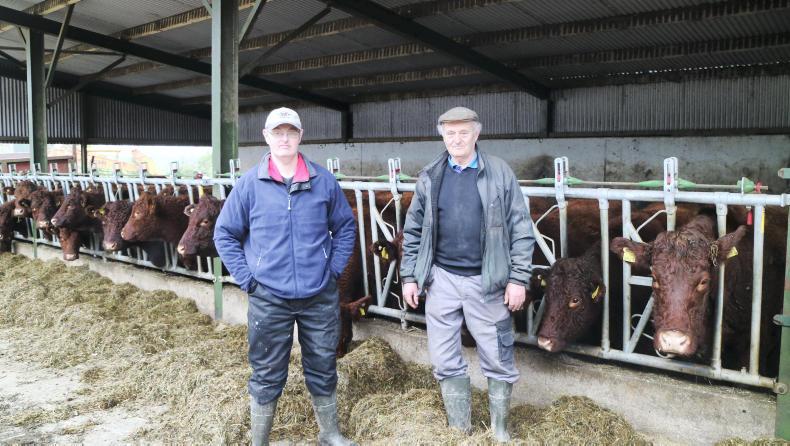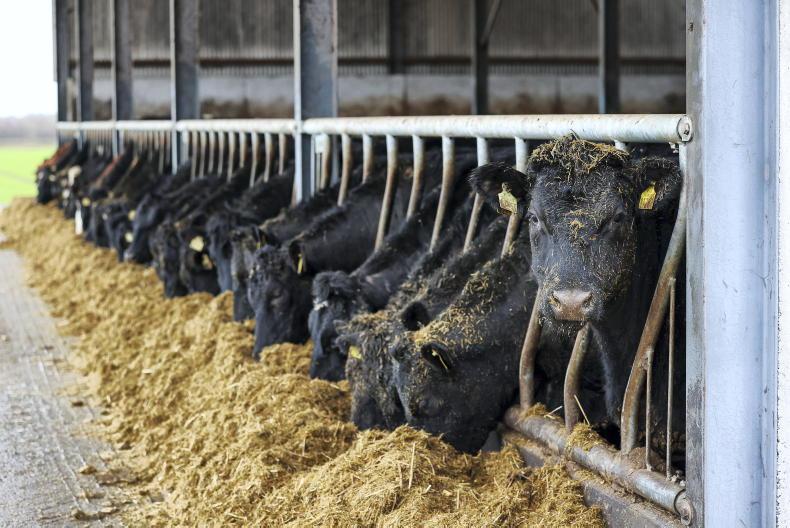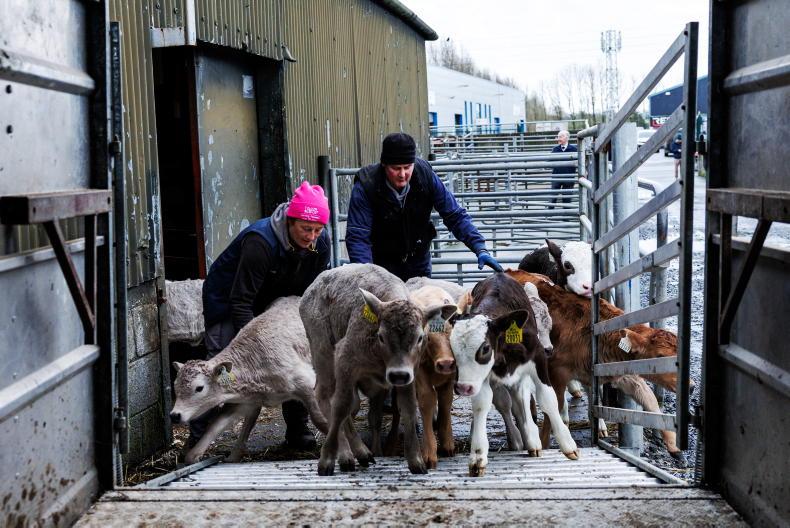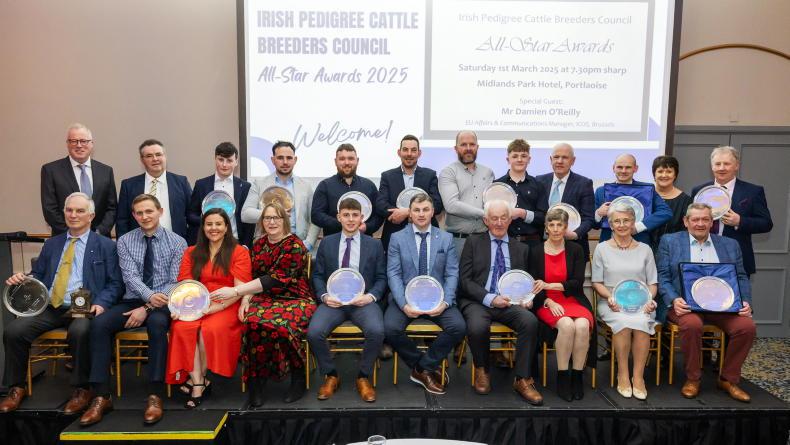Father-and-son duo Joe and Richard Fortune were crowned national pedigree winners of the inaugural FBD €uro-Star €200 competition.
The Co Wexford Salers breeders picked up the award at the ICBF and Sheep Ireland genetics conference which took place in Athlone last December.
The herd, which trades under the Knottown prefix, beat off stiff opposition from over 100 pedigree entries.
The Fortunes farm 120 purebred Salers cows on 220ac of grassland and 50ac of cereals just outside Wexford town.
They got into Salers cattle a number of years ago, while seeking a cow type that was capable of calving a sizable Charolais X calf.
Since then, the herd has gone from strength to strength, with the subsequent formation of the Knottown purebred Salers herd.

Richard and Joe Fortune.
While a 120-cow pedigree herd suggests an enormous volume of breeding animals will be sold off the farm each year, Richard explained the actual number of pedigree bulls sold is much smaller than one might think: “Each year, we would probably sell only five or six pedigree bulls. We only register about 10 or 12.”
He added: “There are fewer than 200 Salers bulls sold in the country annually so we obviously couldn’t expect to be selling 50-plus. It means we are only selling stock bulls with very high genetic merit.”
We breed the best group of cows to a Salers bull which will give us a batch of purebred Salers calves
With 120 purebred Salers cows on the farm and fewer than 10 purebred bulls being sold, Richard outlined that a commercial element is also run in tandem with the pedigree system: “We have the cows split into two groups. You could call it an A team and a B team,” he said.
“We breed the best group of cows to a Salers bull which will give us a batch of purebred Salers calves and the second group of cows are mated to a Charolais bull.”
The calving season on the farm starts in the first week in June with a target calving spread of no more than nine weeks.
In 2019, 125 cows calved with 124 live calves now on the farm. Cows are fed grass silage only over the winter with only first-time calvers fed meal.
All of the Salers X Charolais progeny are sold commercially
Following on from this, Richard explained what happens with the progeny: “Of the purebred calves, all the females will be registered purebred. These will either be kept on-farm for our own replacements or sold off-farm. From the bull calves, we register about 10 or 12 and the rest are finished in a bull beef system.”
All of the Salers X Charolais progeny are sold commercially.
Both bulls and heifers are fed fresh grass indoors from March through to slaughter.
Finishing bulls are supplemented with 1kg concentrates per day up until 12 months of age and are then built up to 6kg per day until early October.
After that, they are fed 8kg per day. The finishing heifers are started on 2kg meal per day in August rising to 4kg per day in September and 6kg in October for those that are not yet sold.
Breeding
From speaking to both Joe and Richard, it is easy to see the passion that they have for breeding and genetics.
Even a brief look at the farm facts panel shows the attention to detail that has been paid to genetics throughout the years.
Firstly, on pedigree bull selection, Richard said: “I won’t register any bull that was over 45kg in weight at birth. I think there is always a danger that certain traits begin to slip within a breed. By ensuring only sires that were easily calved enter the breeding system, it is the best way of keeping calving difficulty within the Salers breed down.”
Furthermore, the high level of data recording that takes place on the farm means that the Fortunes have a wealth of information on each animal which allows them to specifically pick a breeding bull to suit a farmer’s needs.
The objective of the ICBF Gene Ireland beef programme is to identify and subsequently progeny-test high replacement index bulls
The Fortunes have participated in whole herd performance recording since it was first introduced in 2016 which involves routinely linear scoring their stock and recording birth weights and insemination data. They regularly weigh their stock and enter this on the ICBF recording system.
Because of this extra data on their herd, the reliability figures for their stock are significantly ahead of what is seen in many herds.
The objective of the ICBF Gene Ireland beef programme is to identify and subsequently progeny-test high replacement index bulls within all of the different beef breeds so that these bulls can be used within the industry to produce high replacement index heifers.
Since its inception, the Fortunes have bred three Salers bulls that entered the programme.
Knottown Michael (KTM) entered the programme in 2013 and was then sold on to a suckler farmer. His July 2019 replacement index value was €177 with a reliability figure of 75%.Knottown Roy (SA4604) entered the programme in 2015 and was then bought by the National Cattle Breeding Centre where he is now available. His July replacement index value was €267 with a reliability figure of 46%.Knottown Randy (SA4684) entered the programme in 2016 and was then sold to a suckler farmer. His July 2019 replacement index value was €216 with a reliability figure of 51%. On BDGP, Richard said: “We have been using it from the start and constantly recording information so it is really paying off now for our replacement indices. We find the indices generally match the animal on this farm.” Currently, the Fortunes are using a combination of AI and stock bulls for breeding.
Future focus: what’s planned for the Fortune farm?
The plan is to continue to focus on easy calving and calving ability when selecting sires and replacements for keeping and for sale. The intention is to build up a customer base for breeding bulls and replacement heifers. Since no stock are brought to shows and no advertising is done, Richard and Joe rely on building up a good name for high-quality stock, something that has stood them in good stead up to now and has resulted in a high number of repeat customers.
“We will concentrate on the things we can change ourselves within the farm gate and hopefully we will get rewarded for that.”
The Fortunes are a great example of a family farm in the truest sense of the word. This is a pedigree herd run very much on commercial principles.
It clearly demonstrates the profit-making potential that lies within the beef industry first and foremost, but it also shows a clear attempt to only use the best of the best for the continuation of the breed. The open day will cover areas such as grassland management, breeding and the day-to-day management of the farm. Speakers from Teaagsc, ICBF and the Irish Farmers Journal will address different topics on the day.
Father-and-son duo Joe and Richard Fortune were crowned national pedigree winners of the inaugural FBD €uro-Star €200 competition.
The Co Wexford Salers breeders picked up the award at the ICBF and Sheep Ireland genetics conference which took place in Athlone last December.
The herd, which trades under the Knottown prefix, beat off stiff opposition from over 100 pedigree entries.
The Fortunes farm 120 purebred Salers cows on 220ac of grassland and 50ac of cereals just outside Wexford town.
They got into Salers cattle a number of years ago, while seeking a cow type that was capable of calving a sizable Charolais X calf.
Since then, the herd has gone from strength to strength, with the subsequent formation of the Knottown purebred Salers herd.

Richard and Joe Fortune.
While a 120-cow pedigree herd suggests an enormous volume of breeding animals will be sold off the farm each year, Richard explained the actual number of pedigree bulls sold is much smaller than one might think: “Each year, we would probably sell only five or six pedigree bulls. We only register about 10 or 12.”
He added: “There are fewer than 200 Salers bulls sold in the country annually so we obviously couldn’t expect to be selling 50-plus. It means we are only selling stock bulls with very high genetic merit.”
We breed the best group of cows to a Salers bull which will give us a batch of purebred Salers calves
With 120 purebred Salers cows on the farm and fewer than 10 purebred bulls being sold, Richard outlined that a commercial element is also run in tandem with the pedigree system: “We have the cows split into two groups. You could call it an A team and a B team,” he said.
“We breed the best group of cows to a Salers bull which will give us a batch of purebred Salers calves and the second group of cows are mated to a Charolais bull.”
The calving season on the farm starts in the first week in June with a target calving spread of no more than nine weeks.
In 2019, 125 cows calved with 124 live calves now on the farm. Cows are fed grass silage only over the winter with only first-time calvers fed meal.
All of the Salers X Charolais progeny are sold commercially
Following on from this, Richard explained what happens with the progeny: “Of the purebred calves, all the females will be registered purebred. These will either be kept on-farm for our own replacements or sold off-farm. From the bull calves, we register about 10 or 12 and the rest are finished in a bull beef system.”
All of the Salers X Charolais progeny are sold commercially.
Both bulls and heifers are fed fresh grass indoors from March through to slaughter.
Finishing bulls are supplemented with 1kg concentrates per day up until 12 months of age and are then built up to 6kg per day until early October.
After that, they are fed 8kg per day. The finishing heifers are started on 2kg meal per day in August rising to 4kg per day in September and 6kg in October for those that are not yet sold.
Breeding
From speaking to both Joe and Richard, it is easy to see the passion that they have for breeding and genetics.
Even a brief look at the farm facts panel shows the attention to detail that has been paid to genetics throughout the years.
Firstly, on pedigree bull selection, Richard said: “I won’t register any bull that was over 45kg in weight at birth. I think there is always a danger that certain traits begin to slip within a breed. By ensuring only sires that were easily calved enter the breeding system, it is the best way of keeping calving difficulty within the Salers breed down.”
Furthermore, the high level of data recording that takes place on the farm means that the Fortunes have a wealth of information on each animal which allows them to specifically pick a breeding bull to suit a farmer’s needs.
The objective of the ICBF Gene Ireland beef programme is to identify and subsequently progeny-test high replacement index bulls
The Fortunes have participated in whole herd performance recording since it was first introduced in 2016 which involves routinely linear scoring their stock and recording birth weights and insemination data. They regularly weigh their stock and enter this on the ICBF recording system.
Because of this extra data on their herd, the reliability figures for their stock are significantly ahead of what is seen in many herds.
The objective of the ICBF Gene Ireland beef programme is to identify and subsequently progeny-test high replacement index bulls within all of the different beef breeds so that these bulls can be used within the industry to produce high replacement index heifers.
Since its inception, the Fortunes have bred three Salers bulls that entered the programme.
Knottown Michael (KTM) entered the programme in 2013 and was then sold on to a suckler farmer. His July 2019 replacement index value was €177 with a reliability figure of 75%.Knottown Roy (SA4604) entered the programme in 2015 and was then bought by the National Cattle Breeding Centre where he is now available. His July replacement index value was €267 with a reliability figure of 46%.Knottown Randy (SA4684) entered the programme in 2016 and was then sold to a suckler farmer. His July 2019 replacement index value was €216 with a reliability figure of 51%. On BDGP, Richard said: “We have been using it from the start and constantly recording information so it is really paying off now for our replacement indices. We find the indices generally match the animal on this farm.” Currently, the Fortunes are using a combination of AI and stock bulls for breeding.
Future focus: what’s planned for the Fortune farm?
The plan is to continue to focus on easy calving and calving ability when selecting sires and replacements for keeping and for sale. The intention is to build up a customer base for breeding bulls and replacement heifers. Since no stock are brought to shows and no advertising is done, Richard and Joe rely on building up a good name for high-quality stock, something that has stood them in good stead up to now and has resulted in a high number of repeat customers.
“We will concentrate on the things we can change ourselves within the farm gate and hopefully we will get rewarded for that.”
The Fortunes are a great example of a family farm in the truest sense of the word. This is a pedigree herd run very much on commercial principles.
It clearly demonstrates the profit-making potential that lies within the beef industry first and foremost, but it also shows a clear attempt to only use the best of the best for the continuation of the breed. The open day will cover areas such as grassland management, breeding and the day-to-day management of the farm. Speakers from Teaagsc, ICBF and the Irish Farmers Journal will address different topics on the day.









SHARING OPTIONS